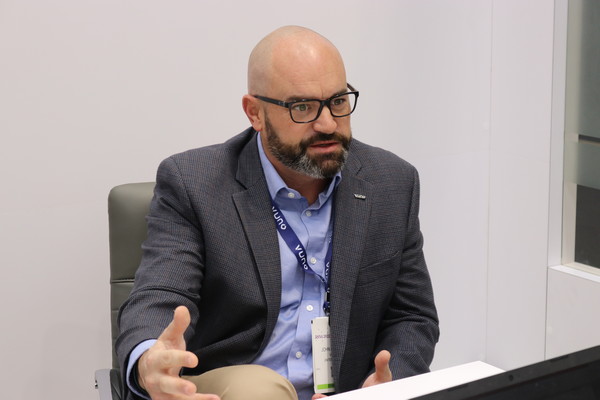CHICAGO, Ill. -- By Lee Han-soo/Korea Biomedical correspondent – The Korean medical device industry is actively trying to advance into the U.S. market by establishing offshoots and hiring foreign executives and employees who know the American industry.
Such a trend was apparent at the Radiological Society of North America (RSNA) 2022 congress, with most Korean AI medical imaging companies commenting on their U.S. offshoot, and introducing top foreign executives.
VUNO, one of Korea's leading AI medical imaging companies, also hired John Luttati as the Vice President of VUNO's North American sales and marketing in May 2021 to accelerate its business in the region.
Luttati has had an extensive career in the medical device industry for almost 20 years. After starting his career at Covidien, which is now a part of Medtronic, in 2007, he worked in various management positions at Olympus Corporation and Candela Medical.
With Luttati’s contribution, VUNO established a U.S. corporation earlier this year and is currently preparing to enter the U.S. market.
While the company focused on setting up its U.S. branch this year, it plans to use the offshoot as a foothold in receiving U.S. Food and Drug Administration (FDA) approval for its AI software in medical imaging, such as VUNO Med-Chest X-ray, in the future.
Korea Biomedical Review met with John Luttati during RSNA 2022 to learn about VUNO's U.S. branch operation and its plans.

Question: Why did you decide to join VUNO?
Answer: Having been working in the medical tech space for over two decades, I saw that there was very clearly a push toward artificial intelligence (AI) and machine learning.
This led me to seek an opportunity in the industry, and VUNO was on my radar through some former colleagues of mine and fit with what I envisioned as the future of the medical device industry.
I think VUNO offers a few unique things, especially its wide portfolio across different areas, which will be very important from a competitive perspective moving forward.
Q: You worked in various global companies like Olympus and Covidien. How does VUNO, a Korean company, compare to the others?
A: When you look at Covidien, which is now part of Medtronic, or Olympus, these companies are multi-billion dollar organizations that have been around for a very long time and established in the market.
Therefore, just the size and the scale are very different.
However, in terms of what needs to happen, I think VUNO is very similar in that innovation fuels this space.
Also, size can be both a good and bad thing.
While a large company can benefit from its large resources, the large size can hinder decision-making as the bureaucracy, and all the red tape can be an issue.
Therefore, for VUNO, the size is a benefit, particularly in the time and space we're in, as AI use in the medical imaging field is very much at the beginning.
So being agile, making quick decisions, and pivoting strategically to understand where the market is and where the customers are is very important.
And I think VUNO is set up very well to do that.
Q: Could you provide the layout of VUNO USA?
A: We established the offshoot in February of last year, and as of now, we have three employees, including me. We are based in Marlborough, Massachusetts, and right now, we're focused on getting a sense of the market, understanding what products in our portfolio make the most sense for this market, how we're going to be able to drive revenue, and what products we should prioritize for FDA approval.
Q: What is the first product you expect to launch in the U.S.?
A: The products we are currently prioritizing are VUNO Med-DeepBrain, VUNO Med-LungCT AI, and VUNO Med-DeepCARS.
We are focusing on these three products because we've gone out and spoken to clinicians and hospitals and there very clearly is a demand for products that can increase efficiency in those areas and help deal with the disease states.
For example, for VUNO Med-DeepBrain, Alzheimer's is, unfortunately, a big and growing issue in the U.S., and the volume of demand for screening is growing.
Therefore, being able to help diagnose Alzheimer's and understand the patient's pathway is very important.
We're in the process of getting FDA approval for both VUNO Med-DeepBrain and VUNO Med-LungCT AI, with some institutions in the U.S.
However, we don't have a firm date. We hope to receive the approval as soon as possible, hopefully by next year.
Q: How are the U.S. doctor's responses who have used VUNO's products?
A: Feedback has been very positive. U.S. doctors are very intrigued not only with the performance of our product but also from a user interface perspective.
We've done a very good job of listening to the customer and understanding how they use it to help with the user interface.
And then, from a performance perspective, the reaction from the doctors has been very positive.
However, there are some areas that we need to address just in terms of specificity around the U.S.

